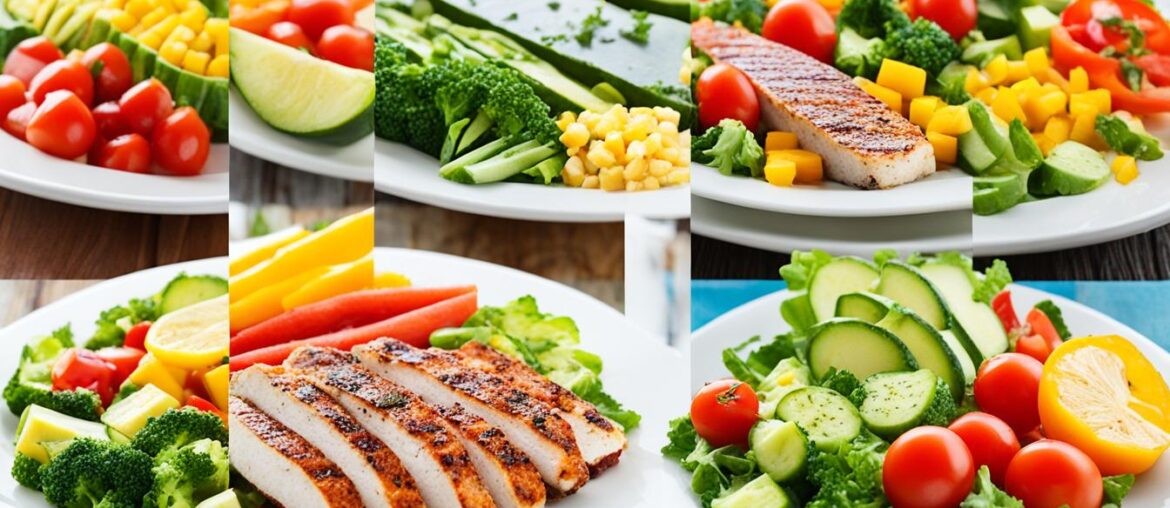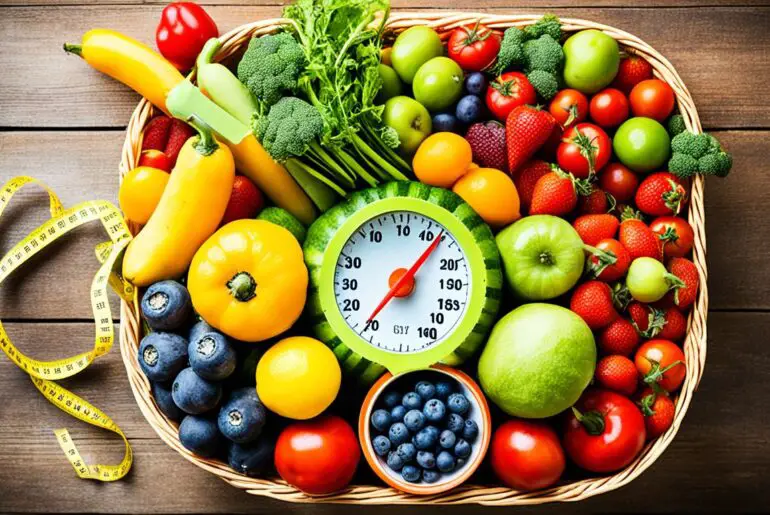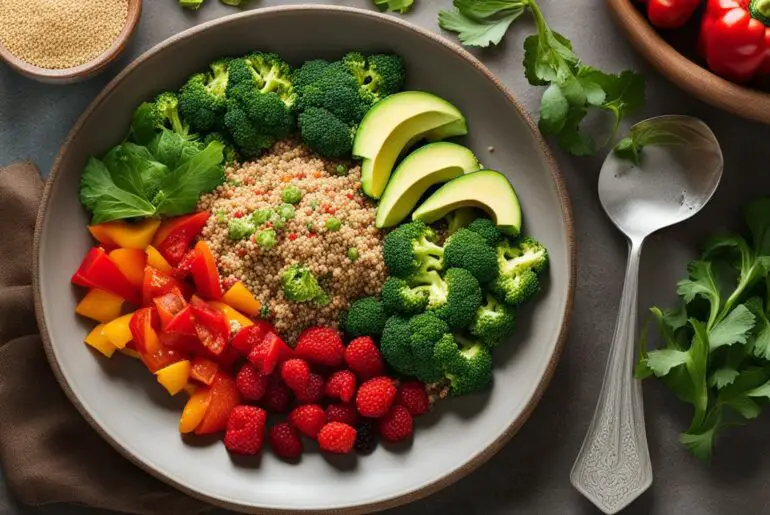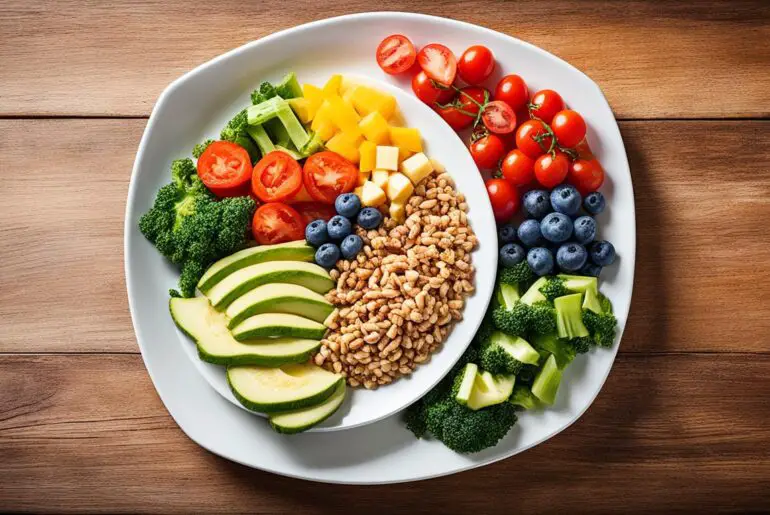Are you looking for an affordable way to lose weight with the HCG diet? Contrary to popular belief, following the HCG diet doesn’t have to drain your wallet. With some creativity and strategic planning, you can find budget-friendly HCG diet meals that are not only delicious but also easy on your pocket. So, how can you enjoy the benefits of the HCG diet without breaking the bank?
Key Takeaways:
- Creating budget-friendly HCG diet meals is possible through strategic planning and creative meal options.
- Focus on cost-effective protein sources like chicken breast, fish, and lean cuts of beef.
- Utilize affordable vegetables and fruits that are in season to keep costs down.
- Consider meal prepping and shopping in bulk to save time and money.
- Explore low-cost HCG diet recipes and meal plans available online for inspiration.
The ‘Budget’ Sample HCG Diet Menu
Looking to follow the HCG diet without breaking the bank? The ‘Budget’ sample HCG diet menu offers a wallet-friendly approach to achieving your weight loss goals. This cost-effective meal plan utilizes fresh foods that can be easily found at your local grocery store, along with a few additional items to enhance flavor and variety. Here’s a sample menu for each day of the week, featuring breakfast, lunch, dinner, and snacks that are low in calories and packed with nutritious ingredients.
Monday:
- Breakfast: Egg white omelet with spinach and cherry tomatoes
- Lunch: Grilled chicken breast salad with mixed greens and cucumber
- Dinner: Baked cod with steamed asparagus
- Snacks: Apple slices with a side of grissini breadsticks
Tuesday:
- Breakfast: Greek yogurt with berries
- Lunch: Turkey lettuce wraps with sliced bell peppers
- Dinner: Beef stir-fry with broccoli and mushrooms
- Snacks: Celery sticks with plain hummus
Wednesday:
- Breakfast: Protein smoothie with almond milk, spinach, and banana
- Lunch: Shrimp skewers with zucchini noodles
- Dinner: Grilled chicken breast with roasted Brussels sprouts
- Snacks: Carrot sticks with a side of cottage cheese
Thursday:
- Breakfast: Quinoa porridge with diced apples and cinnamon
- Lunch: Tuna salad lettuce wraps with diced tomatoes
- Dinner: Baked salmon with sautéed spinach
- Snacks: Hard-boiled eggs with a side of sugar-free gelatin
Friday:
- Breakfast: Vegetable egg scramble
- Lunch: Grilled shrimp salad with mixed greens and avocado
- Dinner: Turkey meatballs with zucchini noodles
- Snacks: Cucumber slices with a side of Greek yogurt
Saturday:
- Breakfast: Oatmeal with almond milk and sliced peaches
- Lunch: Chicken fajita lettuce wraps with salsa
- Dinner: Baked white fish with steamed cauliflower
- Snacks: Hummus with celery sticks
Sunday:
- Breakfast: Spinach and mushroom omelet
- Lunch: Grilled chicken breast with a side of quinoa
- Dinner: Baked cod with roasted asparagus
- Snacks: Mixed berries with a side of grissini breadsticks
By following this ‘Budget’ sample HCG diet menu, you can enjoy affordable and nutritious meals while staying on track with your weight loss journey. Remember to consult with a healthcare professional or registered dietitian before starting any new diet plan. Stay committed and make healthy choices to achieve your desired results.
The ‘Spruced Up’ Sample HCG Diet Menu
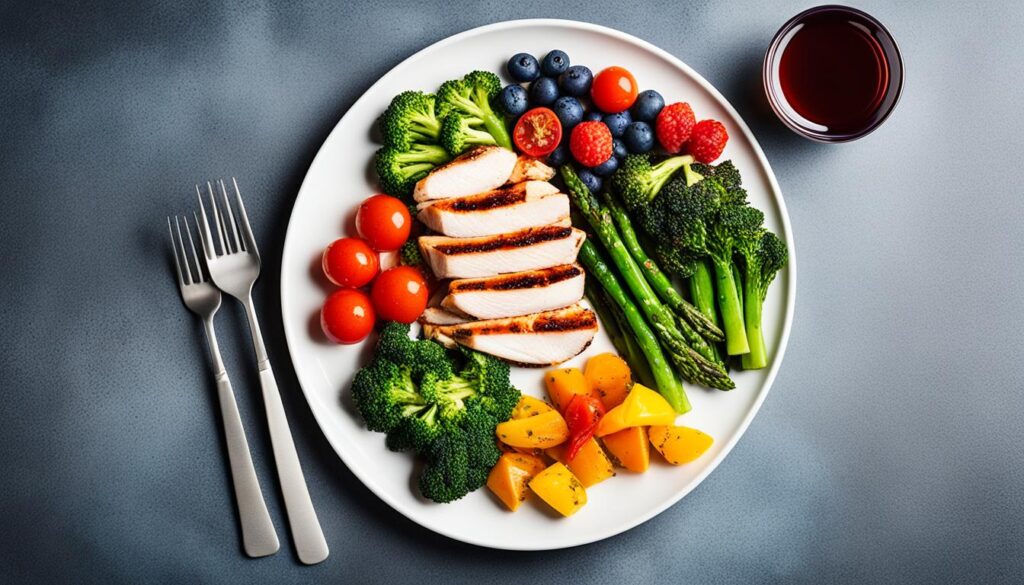
Looking to add more flavor and variety to your HCG diet? The ‘Spruced Up’ sample menu offers a delightful twist to your meal plan. While it’s important to note that the HCG diet is not recognized as safe or effective by health experts, this menu provides a tastier alternative for those who choose to follow it.
Breakfast Options:
- Spinach and mushroom omelet
- Strawberry and spinach smoothie
- Blueberry protein pancakes
Lunch Ideas:
- Grilled chicken salad with mixed greens and Simple Girl salad dressing
- Stuffed bell peppers with lean ground beef and steamed vegetables
- Shrimp stir-fry with broccoli and zucchini
Dinner Choices:
- Baked cod with lemon and herbs, served with steamed asparagus
- Grilled steak with roasted Brussels sprouts
- Chicken and vegetable skewers with Simple Girl BBQ sauce
Snack Suggestions:
- Cucumber slices with hummus
- Apple slices with cinnamon
- Hard-boiled eggs
Remember to consult with healthcare professionals before considering any extreme weight loss plan, including the HCG diet. Prioritizing overall health and sustainable lifestyle changes is crucial for long-term success and well-being.
| Meal | Protein | Vegetables | Fruits | Extras |
|---|---|---|---|---|
| Breakfast | Eggs, chicken, or cottage cheese | Spinach, mushrooms, or bell peppers | Strawberries or blueberries | Stevia for coffee or tea |
| Lunch | Chicken, beef, shrimp, or fish | Mixed greens, lettuce, or broccoli | None | Simple Girl salad dressing |
| Dinner | Steak, chicken, fish, or shrimp | Asparagus, Brussels sprouts, or zucchini | None | Simple Girl BBQ sauce |
| Snacks | Hard-boiled eggs, cottage cheese | Cucumber slices | Apple slices | Hummus |
What Is the HCG Diet?
The HCG diet combines HCG supplements or hormone injections with an extremely low-calorie diet. HCG, which stands for human chorionic gonadotropin, is a hormone produced during pregnancy. The diet is divided into three phases: the loading phase, the weight loss phase, and the maintenance phase.
The loading phase involves consuming high-fat, high-calorie foods for two days while starting HCG supplementation.
The weight loss phase restricts calories to 500 or 800 per day, accompanied by HCG supplements, and can last for three to six weeks.
The maintenance phase gradually increases calories while discontinuing HCG supplementation.
To illustrate the structure of the HCG diet, a table containing an overview of each phase and its key characteristics is presented below:
| Phase | Description | Calorie Restriction | HCG Supplementation |
|---|---|---|---|
| Loading Phase | Consumption of high-fat, high-calorie foods for two days | N/A | Starts during this phase |
| Weight Loss Phase | Significantly reduced calorie intake | 500-800 calories per day | Continued throughout this phase |
| Maintenance Phase | Gradual increase in calorie consumption | Varies based on individual goals | Discontinued during this phase |
This table provides a concise overview of the HCG diet and its different phases, highlighting the calorie restriction and the use of HCG supplements. It is important to note that while the HCG diet may result in rapid weight loss, its safety and effectiveness are not supported by health experts. Consulting with healthcare professionals and considering alternative weight loss approaches is advised.
Is the HCG Diet Safe and Effective?
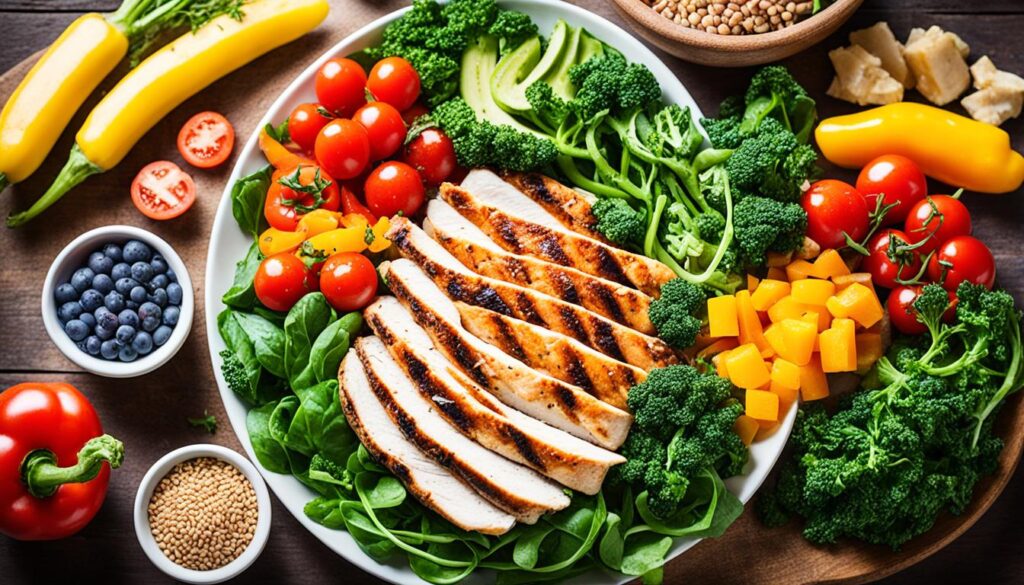
The HCG diet has gained popularity as a quick and dramatic weight loss solution. However, health experts caution against its use, as it is not considered safe or effective. The FDA has approved HCG prescriptions solely for the treatment of female infertility, and the use of HCG supplements for weight loss is illegal.
“The HCG diet is not supported by scientific evidence and may pose serious health risks.”
– Dr. Jessica Johnson, MD
While individuals following the HCG diet may experience rapid weight loss, it is important to note that this is primarily due to the extreme calorie restriction rather than the effects of the HCG hormone itself. Low-cost HCG diet meal plans may appear appealing, but safety concerns and lack of substantial evidence for effectiveness should be taken into account.
Health experts have expressed reservations about the HCG diet due to its potential risks and side effects. The extreme calorie restriction can lead to intense hunger, resulting in headaches, fatigue, and dizziness. Prolonged deprivation of calories can contribute to disordered eating patterns and nutrient deficiencies.
It is crucial to prioritize overall health and consider affordable HCG diet meal options that focus on balanced nutrition and sustainable weight loss. Consulting with healthcare professionals and registered dietitians can help develop personalized eating plans that meet individual needs and goals.
Potential Risks and Side Effects:
- Intense hunger
- Headaches, fatigue, and dizziness
- Disordered eating patterns
- Nutrient deficiencies
While some individuals may achieve weight loss results on the HCG diet, it is important to consider the potential risks and discuss them with healthcare professionals. Affordable HCG weight loss meal options that prioritize long-term health and sustainable lifestyle changes should be explored as alternatives to the HCG diet.
| Risks and Side Effects | Concern Level |
|---|---|
| Intense hunger and potential for disordered eating patterns | High |
| Headaches, fatigue, and dizziness | Moderate |
| Nutrient deficiencies | Moderate |
In conclusion, the HCG diet may promise rapid weight loss, but it is not considered safe or effective by health experts. The potential risks and side effects, combined with the lack of substantial evidence for its effectiveness, make it crucial to seek safer alternatives for achieving sustainable weight loss goals.
What Can You Eat on the HCG Diet?
The HCG diet follows strict guidelines regarding food choices and restrictions. During the weight loss phase, individuals are allowed to consume specific types of foods that align with the principles of the diet. Here is an overview of the foods that are permitted on the HCG diet:
Lean Proteins
- Chicken
- Fish
- Beef
Approved Vegetables
- Spinach
- Lettuce
- Tomatoes
Limited Fruits
- Berries
- Citrus fruits
The HCG diet recommends the use of herbs and spices for flavoring meals. However, it is important to note that certain food categories are restricted. These include dairy products, high-carb foods, fats and oils, sugary foods, and beverages other than coffee, tea, and water.
While following the HCG diet, individuals must also adhere to a significant calorie restriction. This restriction can lead to potential nutrient deficiencies and health risks, so it is important to approach the diet with caution and consult with a healthcare professional.
“The HCG diet restricts certain foods and emphasizes specific choices.”
The HCG diet emphasizes a limited range of foods to support the desired weight loss effect. By focusing on lean proteins, approved vegetables, and limited fruits, the diet aims to provide essential nutrients while keeping calorie intake low. It is essential to consider the potential risks and limitations of the HCG diet before embarking on this restrictive approach to weight loss.
The Cost of the HCG Diet
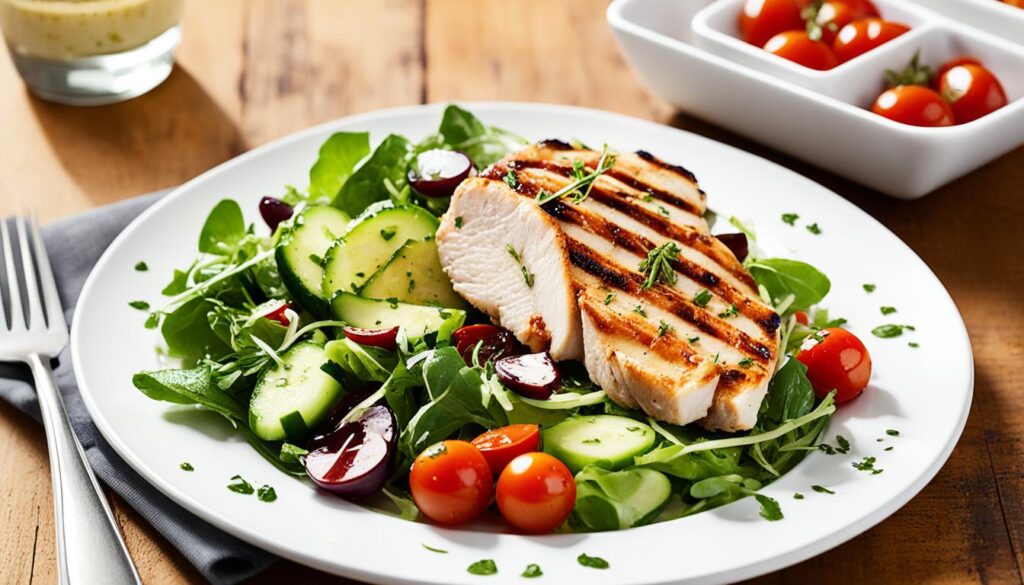
The cost of the HCG diet can vary depending on several factors. One of the main considerations is the source of the HCG supplements or hormone injections. It is important to note that these products are not legally available for weight loss purposes in the United States, which can make it challenging to obtain accurate pricing information. However, some individuals may still find ways to access these products despite their legal status.
In addition to the cost of HCG supplements, there may be healthcare provider fees associated with receiving injections. These fees can vary depending on the provider and location, and it’s essential to factor them into the overall cost of following the HCG diet.
Furthermore, individuals following the HCG diet may need to purchase specific brands or products that are recommended within the diet plan. For example, certain meal options may call for ingredients like Simple Girl salad dressing or flavored liquid stevia. Including these specific items in your diet can add to the overall cost.
It is crucial to consider the financial implications of following the HCG diet, particularly in comparison to other weight loss approaches. While the diet may claim to be budget-friendly, it’s essential to evaluate the long-term sustainability and potential health risks along with the cost. Investing in a diet that is both affordable and effective is important for achieving successful and healthy weight loss.
Potential Risks and Side Effects of the HCG Diet
The HCG diet is a weight loss plan that involves extreme calorie restriction and the use of HCG supplements or hormone injections. While this diet may promise rapid weight loss, it is important to be aware of the potential risks and side effects associated with it.
One of the main risks of the HCG diet is the intense hunger that can arise from the extreme calorie restriction. Consuming only 500 or 800 calories per day can leave individuals feeling unsatisfied and deprived, which may make it difficult to stick to the diet long-term.
In addition to hunger, there are several side effects that may occur while on the HCG diet. These can include headaches, fatigue, dizziness, and irritability. The severe calorie restriction can also lead to disordered eating patterns and nutrient deficiencies, as the diet limits the variety of foods that can be consumed.
Furthermore, it is important to note that the use of HCG supplements or hormone injections for weight loss is illegal and not regulated by the FDA. This means that there is no oversight or guarantee of the safety or efficacy of these products. It is essential to prioritize overall health and consult with healthcare professionals before considering the HCG diet or any other extreme weight loss plan.
It is recommended to explore alternative weight loss approaches that are safer and more sustainable. Consulting with healthcare providers and registered dietitians can help individuals find personalized eating plans that are effective and fit their specific needs and goals. It is important to prioritize long-term health and consider sustainable lifestyle changes rather than quick-fix diet plans.
Alternatives to the HCG Diet
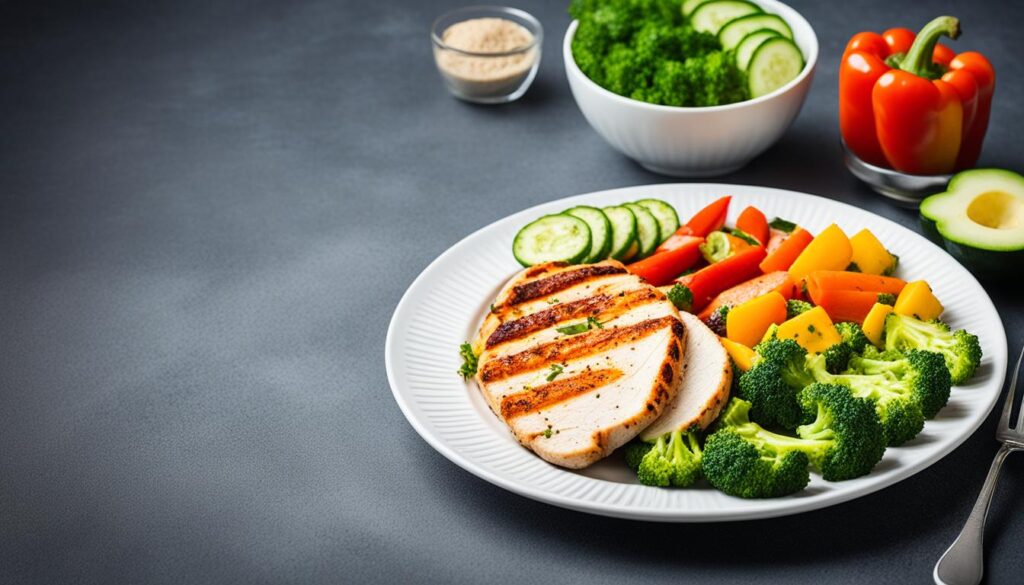
While the HCG diet may offer a quick solution for weight loss, there are safer and more sustainable alternatives available. Consulting with healthcare providers and registered dietitians can help individuals find personalized eating plans that are effective and align with their specific needs and goals. These alternatives prioritize long-term health and promote sustainable lifestyle changes rather than relying on extreme calorie restriction and HCG supplements.
One alternative is to focus on following budget-friendly diet meal suggestions that emphasize whole foods and adequate caloric intake. By incorporating nutritious and low-cost ingredients into meals, such as lean proteins, vegetables, and fruits, individuals can create delicious and affordable HCG diet options at home.
Additionally, participating in regular physical activity is crucial for overall health and weight management. Engaging in activities that suit personal preferences and abilities, such as walking, biking, or dancing, can help individuals achieve their weight loss goals without the potential risks associated with the HCG diet.
“Consulting with healthcare providers and registered dietitians can help individuals find personalized eating plans that are effective and align with their specific needs and goals.”
Promoting Balanced Nutrition
A key alternative to the HCG diet is to focus on balanced nutrition and portion control. By creating meals that include a variety of food groups, individuals can ensure they are getting the necessary nutrients while managing their calorie intake. Incorporating lean proteins, whole grains, fruits, and vegetables into meals can provide the necessary energy and nutrients for weight loss.
In addition, replacing sugary beverages with water, herbal tea, or infused water can help individuals stay hydrated and minimize calorie intake. Consuming smaller portions and eating mindfully can also contribute to weight loss and promote healthy eating habits.
Customized Meal Plans
Another alternative is to work with healthcare providers or registered dietitians to create customized meal plans. These plans can be tailored to individual preferences, dietary restrictions, and budget constraints. By incorporating affordable and easily accessible ingredients, individuals can follow low-cost HCG diet meal plans that meet their nutritional needs and support their weight loss goals.
The Power of Support
Joining support groups or enlisting the help of a weight loss coach can be valuable alternatives to the HCG diet. These resources provide guidance, motivation, and accountability throughout the weight loss journey. They can also provide tips and strategies for budget-friendly HCG weight loss meal options that are both effective and sustainable.
Emphasizing Healthy Habits
Lastly, it is important to focus on developing and maintaining healthy habits for long-term weight management. This includes practicing portion control, engaging in regular physical activity, managing stress, and getting enough sleep. These lifestyle changes can contribute to sustainable weight loss and overall well-being.
By exploring alternatives to the HCG diet, individuals can find approaches to weight loss that prioritize their health, budget, and long-term success. Adopting healthy eating habits and incorporating regular physical activity can lead to sustainable weight loss and improved overall health.
| Alternatives to the HCG Diet | Pros | Cons |
|---|---|---|
| Promoting Balanced Nutrition | – Provides essential nutrients – Supports overall health – Sustainable approach to weight loss |
– Requires meal planning and preparation – Potential need for dietary adjustments |
| Customized Meal Plans | – Tailored to individual preferences – Can accommodate dietary restrictions – Helps with budgeting |
– May require professional guidance – Requires meal planning and preparation |
| The Power of Support | – Provides guidance and motivation – Offers accountability – Share experiences and tips |
– May involve additional costs – Relies on external support |
| Emphasizing Healthy Habits | – Supports long-term weight management – Promotes overall well-being |
– Requires consistent effort – May take time to see results |
Conclusion
The HCG diet, which relies on the use of HCG supplements or hormone injections alongside severe calorie restriction, is not endorsed as safe or effective by health professionals. This diet poses potential risks and side effects, such as nutrient deficiencies and disordered eating habits. It’s important to note that the use of HCG supplements or hormone injections for weight loss is illegal and unregulated by the FDA.
Instead of resorting to the HCG diet, there are safer alternatives that prioritize balanced nutrition and sustainable lifestyle changes. Consulting with healthcare professionals and registered dietitians can help individuals develop personalized weight loss plans that cater to their specific needs and promote long-term health.
When seeking affordable and budget-friendly meal options, it’s crucial to consider approaches that prioritize whole foods, portion control, and regular physical activity. These lifestyle changes can yield effective weight loss results without the potential risks and extreme restrictions associated with the HCG diet.
FAQ
What is the HCG Diet?
The HCG Diet is a weight loss plan that combines the use of HCG supplements or hormone injections with an extreme reduction in calories. The diet is divided into three phases: the loading phase, the weight loss phase, and the maintenance phase. During the weight loss phase, individuals consume either 500 or 800 calories per day, spread over two meals. The diet emphasizes lean proteins, certain approved vegetables and fruits, and limited seasonings. It is important to note that the use of HCG supplements for weight loss is not approved by the FDA and is considered unsafe and illegal.
Is the HCG Diet safe and effective?
The HCG diet is not considered safe or effective by health experts. The FDA has only approved HCG prescriptions for the treatment of female infertility, and the use of HCG supplements for weight loss is illegal. While individuals may experience rapid weight loss on the HCG diet, it is primarily due to extreme calorie restriction rather than the HCG hormone itself. Many experts caution against trying the HCG diet, citing safety concerns and lack of substantial evidence for its effectiveness.
What can you eat on the HCG Diet?
The HCG diet restricts certain foods and emphasizes specific choices. During the weight loss phase, the diet allows for lean proteins such as chicken, fish, and beef, as well as approved vegetables like spinach, lettuce, and tomatoes. A limited selection of fruits, including berries and citrus fruits, is also permitted. The diet encourages the use of herbs and spices for flavoring and restricts dairy products, high-carb foods, fats and oils, sugary foods, and beverages other than coffee, tea, and water. It is important to note that the HCG diet significantly limits calorie intake, which can lead to nutrient deficiencies and potential health risks.
What is the cost of the HCG Diet?
The cost of the HCG diet can vary depending on factors such as the source of HCG supplements, healthcare provider fees for injections, and the cost of purchasing approved foods and ingredients. Injections and HCG supplements are not legally available for weight loss purposes in the United States, making it difficult to obtain exact pricing information. Additionally, the HCG diet may require individuals to purchase specific brands or products, such as Simple Girl salad dressing or flavored liquid stevia. It is important to consider the potential financial implications of following the HCG diet, as well as the overall effectiveness and safety of the diet itself.
What are the potential risks and side effects of the HCG Diet?
The HCG diet is associated with several potential risks and side effects. The extreme calorie restriction can lead to intense hunger, as well as side effects such as headaches, fatigue, and dizziness. Prolonged calorie deprivation can also contribute to disordered eating patterns and nutrient deficiencies. The use of HCG supplements or hormone injections for weight loss is illegal and not regulated by the FDA, meaning there is no oversight or guarantee of the safety or efficacy of these products. It is important to prioritize overall health and consult with healthcare professionals before considering the HCG diet or any other extreme weight loss plan.
What are the alternatives to the HCG Diet?
There are many alternatives to the HCG diet that offer safer and more sustainable approaches to weight loss. Consulting with healthcare providers and registered dietitians can help individuals find personalized eating plans that are effective and fit their specific needs and goals. Healthy, balanced meal plans that prioritize whole foods, adequate caloric intake, and regular physical activity can support weight loss without the potential risks and extreme restrictions of the HCG diet. It is important to prioritize long-term health and consider sustainable lifestyle changes rather than quick-fix diet plans.

